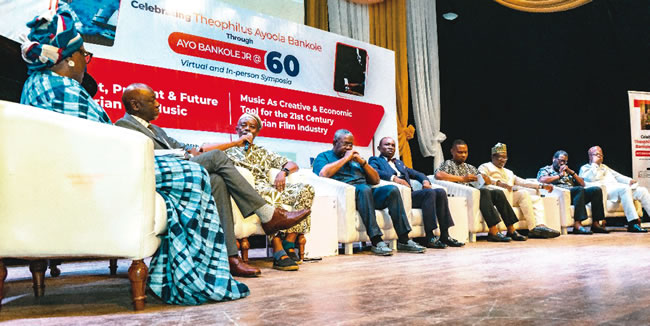Players from the movie, music and media used the 60th birthday of musicologist, pianist and composer, Ayo Bankole Jnr to call for better collaboration between movies and music.
THE symbiotic relationship between movies and music was the focus of a symposium held on May 25 at the MUSON Centre, Onikan, Lagos, commemorating the 60th birthday of musicologist, pianist and composer Ayo Bankole Jnr.
Apart from his footprints in classical and African music, the celebrator, son of the iconic Ayo Bankole, has also contributed to the emergence of distinct Nigerian screen music composition, jingles, soundtracks and new forms of digital music-making.
The symposium themed ‘Music as a Creative and Economic Tool for the 21st Century Nigerian Film Industry’ came after another ‘The past, present and future of Nigerian Art Music: Celebrating Theophilus Ayoola Bankole Through Ayo Bankole Jr. at 60’ in the morning.
Actress Joke Silva moderated the session, featuring filmmakers, musicians and a leading arts journalist. They were Tunde Kelani, Femi Odugbemi, Sani Muazu, Dr Bayo Adepetun, Seun Owoaje, Okechukwu Ogujiofor, Steve Ayorinde and Bayo Omole.
The event, which lasted about two hours, was a riveting one with the panellists’ analyses of music in Nigerian movies and how they could better synchronise them for aesthetic and economic benefits.
Cinematographer Kelani, who spoke first, congratulated the celebrator and painstakingly highlighted how music is an integral part of filmmaking. He lamented the meagre number of cinemas in the country compared to France and how research on Nollywood doesn’t reckon with scores. He also reiterated why producers must prioritise it.
“I’m working on a project, and again, Seun Owoaje comes in. Seun takes it a bit further, and it’s in collaboration with the University of Delaware. You can call it a cultural fusion, where I made the film and composed the music. The orchestra of Delaware University plays. We are sitting on a goldmine. We have to show more interest and work with the musicians. Before making the film, we should think of the song. I was going to make ‘White Handkerchief’, and once the script was ready, I took it to Beautiful Nubia for the theme music. He took me seriously and made the track ‘Ikoko Akufo’ before I shot the movie. There is no doubt that the music sometimes gives the film a unique identity. ‘Ise Oluwa’, Quincy Jones used it in ‘Root’. So, let’s get on with it, and by the end of the day, I’m sure we’ll find the direction.”
Adepetun, a medical doctor turned sound designer and composer, recalled the early days with Bankole and how he stumbled on wealth serendipitously with his first jingle.
“I taught myself, and I realised I had a passion for composing music. Nobody could teach me to play the piano normally because I taught myself my way; I write music my way. I met Ayo at King’s College and had a band called The Clinic. This young chap just came there and did some things. And I was like, where has this guy come from? He was playing way beyond his years. From that time onwards, we always got together whenever I had the opportunity. We played the music for fun until one fateful day when one of the guys from the ad agencies asked me to do a jingle. I asked him, what’s the meaning of jingle? He said music for radio, and I said ok, no problem.
“This is where the money part comes in. I had no idea what a jingle meant, but I knew I listened to ads on the radio. I also had synthesisers and a sequencer. I went into my study during my break and did my first full jingle, which ran for 20 years. That was Union Bank jingle. It featured the late Tyna Onwudiwe and Bankole Aluko. We quickly rushed to a studio, and I gave it to them. I did not realise that it took a two-week round trip to England to do jingles with a gentleman called Defterios or something who charged them a lot of money.
“So, I presented this tape to Lintas, and everybody came out to look at this oddity; this guy in a white tunic who’s also a doctor who’s just done this thing. The MD said I shouldn’t be annoyed with what they would give me because they had spent a lot of money on this particular job. They gave me an envelope, and I had not held that kind of money in my hands. This was N4000. Understand this: a plane ticket to London was three hundred and something naira, and I went into my study, did this for four hours, and they gave me N4000!
“Ayo was always around, and I told him, let’s do these jingles. That was how I started, and I think we had some success. There was a particular day we did nine jingles. Of course, the law of diminishing returns set in by the time we finished. Then on just the cash flow, I built the first, second and third studios without borrowing a penny from the bank.”
Frontline producer/director, Odugbemi expressed happiness that Nigerian producers are now beginning to understand the place of music in movies.
“I’m pleased with what we now have as sound in Nigerian cinema. If there is any place I think we needed a quantum leap, it has been the music, effects and all the things you mix to create a mood. We’ve needed it to accentuate the performances and the storytelling. I think it’s in the last five years that those elements have also come into our storytelling. So, if we are going to create a visually impactful film industry, we don’t bring sound and music as an add-on. There has to be something that is part of our interpretative approach and creative intent. Previously, what we were doing was filling the spaces. But now, we have a goal in terms of creativity.
“So that is a way I think it loops into our title: how do we create an economy out of it as a product? Well, the first thing is we need to invest in it. It is not just investing in the equipment but understanding what is uniquely ours that can better define our films. Our stories so that what you all Nigerian pop music is doing out there can be visually brought into a space of interpretation.”
Narrating how he gets music for his films, actor, producer, and director Sani Muazu recalled how a centre at the Ahmadu Bello University, Zaria, recorded folk music but became defunct when he joined television.
He also disclosed his close friendship with gospel musician Panam Percy Paul as young boys in Jos and how the musician started assisting them in creating a mood for their productions when he became a TV producer. However, Paul’s preference for gospel music made him establish his music studio, Lenscope Media, in 1995.
“I started Lenscope Media and didn’t know how to produce music. But as a facility owner, I was able to buy mixers, monitors and others. Lenscope Media became one of the first places that churned out music for television and film in the northern part of Nigeria. When Kannywood started, people in the television industry had to come to Jos, Lenscope Media, to produce music. But even then, there was a conflict in me because what we were doing was to read your scripts and create music. And then you will have to go and listen to what we have already made to be able to score your film, which was even then, against the grain for me. I wanted a situation where we’ll look at your shots or edited material and produce music that will suit the exact mood we want to create for the particular scene.
“When you are talking about making money from it, sometimes it is not just the cash; it is the satisfaction you derive. Music, to me, is not just a tool that helps tell a story. It is the story because producing music is another pedestal that accentuates the story or mood, culture, period, and frame of mind. And it affects the audience in the same way. Once you can get it right, it has a way of getting to the audience.”
Giving his take on the subject, the producer of Living in Bondage, Nneka the Pretty Serpent and Amina, Okey Ogujiofor, said he didn’t know music could be an additional source of revenue. He lost money because of this ignorance.
“Nigeria’s music industry is doing well globally. Our films are doing so well globally, but there’s no marriage yet. There is no film you watch that you will not hear a sound, but how global are those sounds? That’s the point. So what causes this disparity is that the producers, me because I’m not going to talk about another person; the vision and knowledge that we can make money from music have never been there. But it is coming now. Whilst there is no knowledge, vision is lost. When a producer knows he can make money from music, the vision to deliberately create music that will sell the film becomes very important. Most of our industry practitioners have very little vision for the industry. They’re not thinking global. If you are thinking global, make sure the film and sound are ok. These two elements that make up the film mimic life, and as long as they’re ok, you can see the movie anywhere in the world.”
On the point when he would like to get the script, composer Seun Owoaje who scores movies said he would prefer it at the conceptualisation stage. “Different composers have different routines, but for most composers who are serious about creating something original and compelling, the best time to get the script is before the first shots. So that at least the composer can go through the scripts and have an artistic image. Going through the script is a project; you are going through it with discussions with the producer and director to get their viewpoints and worldview of what they want to create. They can be on the same page. To get an artistic image and understanding of what the movie is about. The Nigerian film industry has come a long way. I’m proud of that because we can push the musical dimension further. Our films can become more interesting and creative if we focus on it and fine-tune these techniques.”
Bayo Omole, who joined virtually, spoke about how creativity in the music industry affects the film industry. He also touched on the law’s importance and why it must be binding on all parties. “
Renowned critic and former Lagos State Commissioner for Tourism, Arts and Culture, Steve Ayorinde, highlighted how music has played its part in Nigerian film’s evolution. He mentioned the likes of Stanley Okorie, Sammy Okposo and Tope Alabi, who had stints as movie soundtrack producers.
“What is lacking is what I think Mr Odugbemi and a few other people have pointed out, which is to say that the ecosystem is very modest. The fanciful, false narrative that takes us nowhere is part of what the Nigerian film industry would need to purge itself of. We are not the second largest film producer in the world, but I understand where we’re coming from when we say that. What led to that, around 2005 and 2006, was something that UNESCO did, which was basically to highlight that we were the third ‘wood’ after Hollywood and Bollywood but ended with wood. It’s got nothing to do with the size of the industry. Hollywood is number one because of the totality of the industry’s worth, including its music ecosystem; what it contributes. India, which we say is the second, produces more films than Hollywood.
“The false narratives can’t help us, it can’t help the industry, and it comes to what Mr Ogujiofor said about the non-existent marriage between the film industry and the music industry. Unlike Nollywood, I think that the music industry has found its character, and that character is devoid of the politics that is killing Nollywood, slowing it down in terms of achieving its full potential.”






